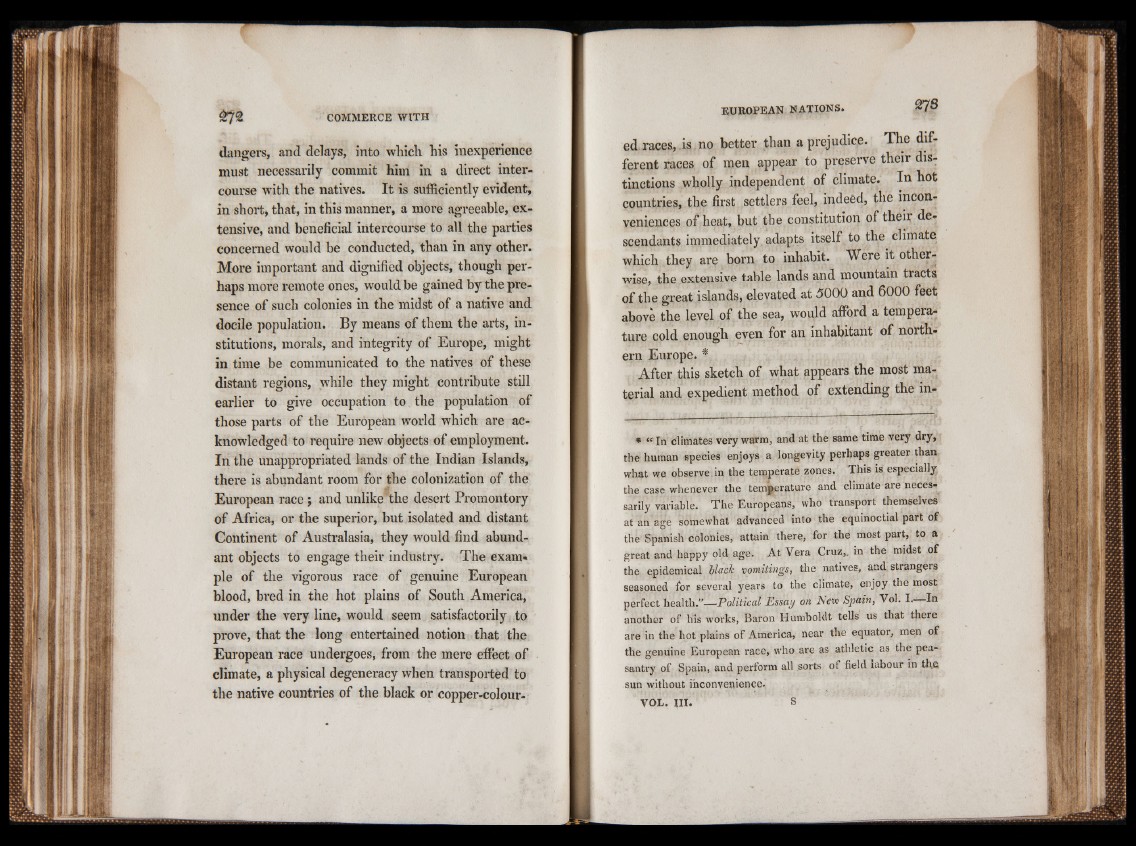
dangers, and delays, into whicli his inexperience
must necessarily commit him in a direct intercourse
with the natives. It is sufficiently evident,
in short, that, in this manner, a more agreeable, extensive,
and beneficial intercourse to all the parties
concerned would be conducted, than in any other.
More important and dignified objects, though perhaps
more remote ones, would be gained by the presence
of such colonies in the midst of a native and
docile population. By means of them the arts, institutions,
morals, and integrity of Europe, might
in time be communicated to the natives of these
distant regions, while they might contribute still
earlier to give occupation to the population of
those parts of the European world which are acknowledged
to require new objects of employment.
In the unappropriated lands of the Indian Islands,
there is abundant room for the colonization of the
European race ; and unlike tlie desert Promontory
of Africa, or the superior, but isolated and distant
Continent of Australasia, they would find abundant
objects to engage their industry. The example
of the vigorous race of genuine European
blood, bred in the hot plains of South America,
under the very line, would seem satisfactorily to
prove, that the long entertained notion that the
European race undergoes, from the mere effect of
climate, a physical degeneracy when transported to
the native countries of the black or copper-coloure
u r o p e a n n a t io n s . 27S
ed races, is no better than a prejudice. The different
races of men appear to preserve their distinctions
wholly independent of climate. In hot
countries, the first settlers feel, indeed, the inconveniences
of heat, but the constitution of their descendants
immediately, adapts itself to the climate
which they are born to inhabit. Were it otherwise,
the extensive table lands and mountain tracts
of the great islands, elevated at 5000 and 6000 feet
above the level of the sea, would afford a temperature
cold enough even for an inhabitant of northern
Europe. *
After this sketch of what appears the most material
and expedient method of extending the in*
“ In climates very warm, and at the same time very dry,
the human species enjoys a longevity perhaps greater than
what we observe, in the temperate zones. This is especially
the case whenever the temperature and climate are necessarily
variable. The Europeans, who transport themselves
at an age somewhat advanced into the equinoctial part of
the Spanish colonies, attain there, for the most part, to a
great and happy old age. At Vera Cruz,, in the midst of
the epidemical block vomitings, the natives, and strangers
seasoned for several years to the climate, enjoy the most
perfect health.”— Political Essay on New Spain, Vol. I.—In
another of his works, Baron Humboldt tells us that there
are in the hot plains of America, near the equator, men of
the genuine European race, who are as athletic as the peasantry
of Spain, and perform all sorts of field labour in the
sun without inconvenience.
VOL. III. S